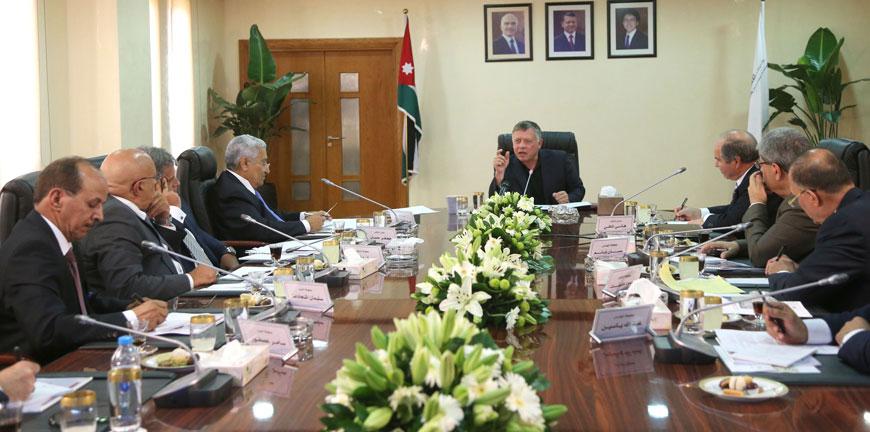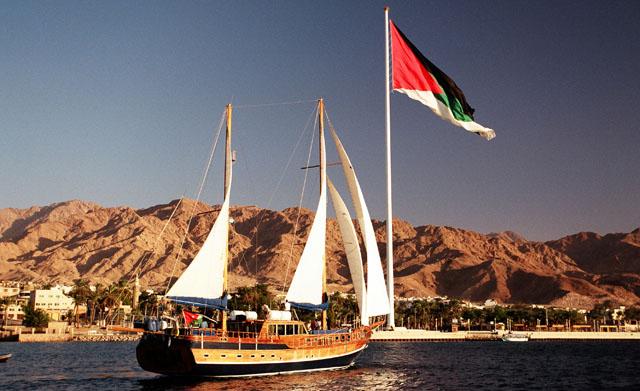You are here
‘15 years after ASEZA’s establishment, Aqaba ready to give back’
By Khetam Malkawi - Nov 28,2015 - Last updated at Nov 28,2015
AQABA — Fifteen years after the establishment of the Aqaba Special Economic Zone Authority (ASEZA), the Red Sea resort city “has matured and is ready to give back”, ASEZA Chief Commissioner Hani Mulki said, adding that increasing the city’s accessibility is a priority to achieve the planned goals.
Moreover, ASEZA will focus on the supply-driven approach so that investors and visitors coming to Aqaba can find what they look for immediately, rather than ask for a certain service and wait until it is provided.
In a meeting with journalists last week, Mulki noted that in the last 10 to 12 years, ASEZA was working on a demand-driven approach, waiting for something to happen to provide services.
But “today, we are moving to a different approach”, he said.
In this regard, ASEZA is now working on establishing its own airlines or partnering with a regional airline to serve the different purposes of the region’s countries and increase accessibility to the Kingdom’s only port.
“The centre of doing business and tourism in Aqaba is accessibility…we have to improve accessibility”; thus, “we are looking for a regional airline to improve accessibility” and promote Aqaba better, the former minister said.
Contacts have been already initiated to find a regional airline, with which “we can partner”.
Although this service is not demand-driven for now, and there will be losses in the beginning, Mulki said, it is crucial and “we can’t wait for somebody to order [it]”.
According to the ASEZA chief commissioner, there will be no fewer than 1,000 apartments from different projects next year, and accessibility is needed for potential buyers — expatriates in Gulf Arab countries who would prefer to come to Aqaba directly rather than fly to Amman and then to the port city, in addition to retirees from around the world.
“We are almost done with the feasibility study. We have the partners lined up… the only problem is that do we start with a full fledged regional airline or do we start with one single plane?”
Aqaba, which only had 500 hotel rooms in 2000, now has 5,000 rooms, and the number is expected to reach 8,000 by the end of 2016.
A regional gateway
The ASEZA official stressed the importance of investing in Aqaba now before the reconstruction of Syria and Iraq starts, as it is a gateway for trade to flow into these two countries.
“We are telling everybody — today is the time to invest; do not come tomorrow. After reconstruction starts, then maybe it will be late… today is the time that we need to start investing with an eye on a market bigger than Jordan, a market that [encompasses] Iraq and Syria,” Mulki told reporters.
Although Syria is on the Mediterranean, trade movement is now coming from the East to the West, which adds to the uniqueness of Aqaba as a destination and its potential to be the gateway for this flow, he noted.
Today, Jordan’s economic ties with Syria and Iraq are more important than ever, Mulki underscored.
“We know exactly what is going to happen there in reconstruction. You can’t get somebody who doesn’t know about Syria or Iraq. So, when I am talking about... investments... I always like to talk about the regional market,” he explained, noting that economic boundaries no longer exist in the region, just political ones.
“People know if they come here... they can export to Syria very simply, [in addition to] Iraq and the northern region of Saudi Arabia,” Mulki said.
Neighbouring governorates, including Maan, would also benefit from the development of Aqaba, as in the case of governorates neighbouring Amman and Irbid, according to the official.
To avoid economic disparity, “we have to make sure that whatever developments come in Aqaba spill over to neighbouring governorates”.
One of these planned benefits is having the Aqaba-Maan oil pipeline that can later be linked to the Iraqi pipeline.
In addition, Mulki noted, having nine ports in Aqaba without having a dry harbour will affect efficiency; therefore, there is a plan to establish one in Maan, some 220km south of Amman.
Challenges
One of the main challenges, however, is how to improve the service sector to encourage national and international businesses to come to Aqaba, according to Mulki.
The local service sector, he said, has moved outside of Jordan because of taxes. “We hope we can bring them back to Aqaba.”
“If we can bring back the law, engineering and accounting firms, and give them the same tax incentives they get in Gulf Cooperation Council countries, this would solve our problem in the real estate [sector], because these people need houses,” Mulki added.
Other challenges include the need to improve the commercial sector in Aqaba, which now has a population of around 160,000 — up from 60,000 in 2000.
Related Articles
With the aim of promoting Aqaba as an “inexpensive” tourist destination, the Aqaba Carnival increased occupancy rates in the city’s hotels despite discouraging factors, an official said on Sunday.
AMMAN — His Majesty King Abdullah on Wednesday stressed the important role of the Aqaba Special Economic Zone Authority (ASEZA) in supportin
Millions of football fans watching the UEFA Champions League will see advertisements of Jordan’s golden triangle of tourism: Aqaba, Petra and Wadi Rum, an official said on Thursday.














